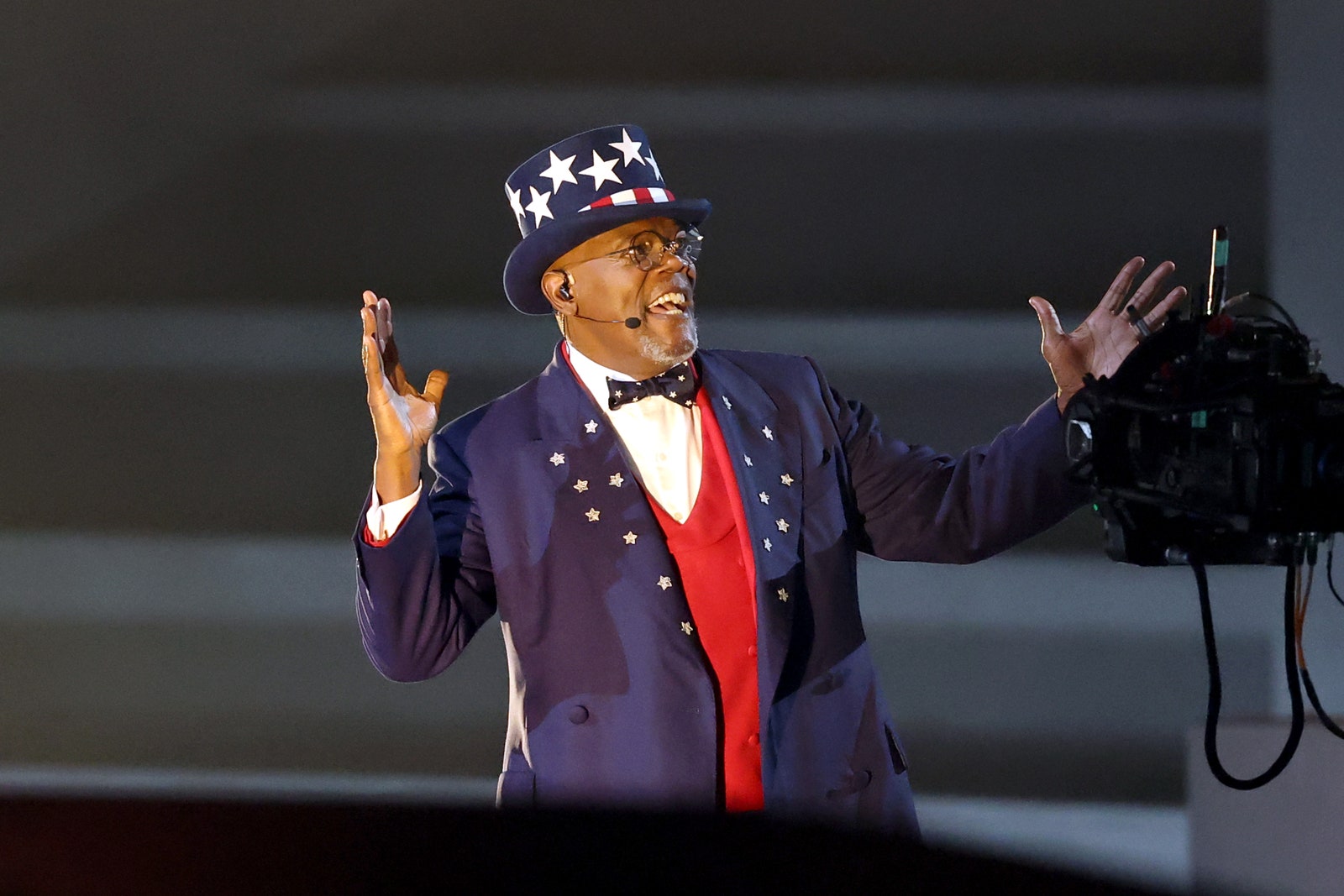The audience came for blood, but Kendrick Lamar made them wait. With his Super Bowl LIX halftime performance, Kendrick reminded everyone that, despite over 50 years of hip-hop history, rap still struggles for widespread recognition as a legitimate art form. And an important part of the genre is competition. His halftime show embraced that motif, framing America, football, the Super Bowl, and himself as components of a larger machine. The first face on screen? Samuel L. Jackson as Uncle Sam, the show’s narrator and scorekeeper, who declared, “This is the great American game.” Hip-hop is a quintessential All-American sport, too.
Kendrick opened the performance atop a black Buick Grand National Experimental—the namesake of his 2024 album—wearing flare jeans, locked into a Gremlin stance, and spitting verses mainstream viewers probably couldn’t even Shazam before launching into GNX’s “Squabble Up.” He closed with a diss track that had the Caesars Superdome singing along to his pettiest lines, as Serena Williams delivered what had to be the Super Bowl’s first-ever on-field revenge-Crip Walk. The diss record symbolizes utter domination in hip-hop. And so goes America and football. But what do rap and football mean to Kendrick? Drama, sport, spectacle.
Hip-hop has asserted its dominance on the Super Bowl stage since Jay-Z and Roc Nation began handling production with the 2020 show. Last night, Kendrick stood alone as the first solo rap headliner, less as a critical darling and more as a status symbol of hip-hop’s ascent. Just a week ago, he won five Grammys, including Song and Record of the Year for “Not Like Us,” cementing the Drake diss track as a cultural fixture—something we all already knew. But last night’s halftime show painted Drake as a dispensable henchman and America as the ultimate adversary. His high-octane GNX tracks made his set feel more contemporary and less like a legacy performance, à la Usher or Rihanna’s recent outings. The show was rich with subtext and loosely political—Kendrick’s reference to Gil Scott-Heron’s “The Revolution Will Not Be Televised” at the start; Jackson’s taunt, “Mr. Lamar, do you really know how to play the game?” For “Humble.,” Kendrick and his dancers formed an American flag with their bodies. Searching for meaning in Kendrick’s imagery can feel vexing when the meaning is more symbolic than overt. Maybe it’s about dominance at all costs. Maybe it’s all just a sick game where the most Kendrick could do was push the envelope as far as the NFL and the televised broadcast system would allow.
Kendrick also seemed to use his Super Bowl platform to try to dismantle stereotypes about rap (that it’s not a serious genre) and himself (that he wasn’t worthy of a halftime set). The show contrasted sharply with his more plainly defiant Pop Out concert, where he performed “Not Like Us” five times straight, reveling in all things community and California. Here, he toyed with expectations: He ceded the stage to SZA, resplendent in red, to sing GNX’s saccharine ballad “Luther” and the Black Panther hit “All the Stars.” Lines like “I hate those that feel entitled” hit a little more menacingly under the Super Bowl lights.
Earlier in the show, Kendrick teased, “I wanna perform their favorite song… but they wanna sue,” nodding to Drake’s defamation lawsuit against Universal Music Group. Minutes later, Jackson would interject, “You done lost your damn mind,” before Kendrick finally kicked off “Not Like Us” with a new verse: “Forty acres and a mule/This is bigger than the music,” he rapped. “Yeah, they tried to rig the game/But you can’t fake influence.” Another menacing moment: Kendrick circling his dancers, treating the stage like musical chairs, presumably boring into Drake’s soul through the lens. The line “Say, Drake, I hear you like ’em young!” was rapped directly into the camera with a Cheshire grin.
While Kendrick’s show broadly gestured at political strife and inequity, one of his performers unfurled a flag in support of Sudan and Palestine. The unplanned protest wasn’t—and would never knowingly be—televised, but it was an odd consolation for anyone still placing bets on Kendrick doing something similarly radical with his platform. And Mustard provided the night’s hypest moment with “TV Off,” pantomiming and holding his chain up to the camera in the background to flex. It was the only time Kendrick welcomed a hypeman on stage, highlighting how vital that type of wingman energy is to a great rap show. But in the end, it was Kendrick alone standing victorious over his enemy to the north. As for America, that’s a longer fight for another day.
